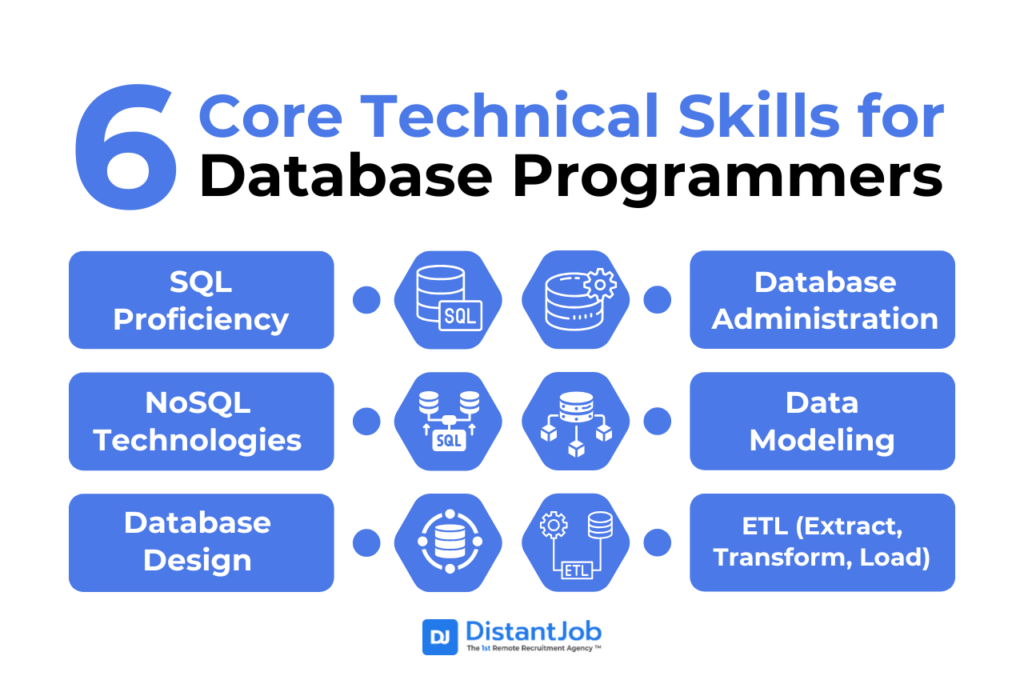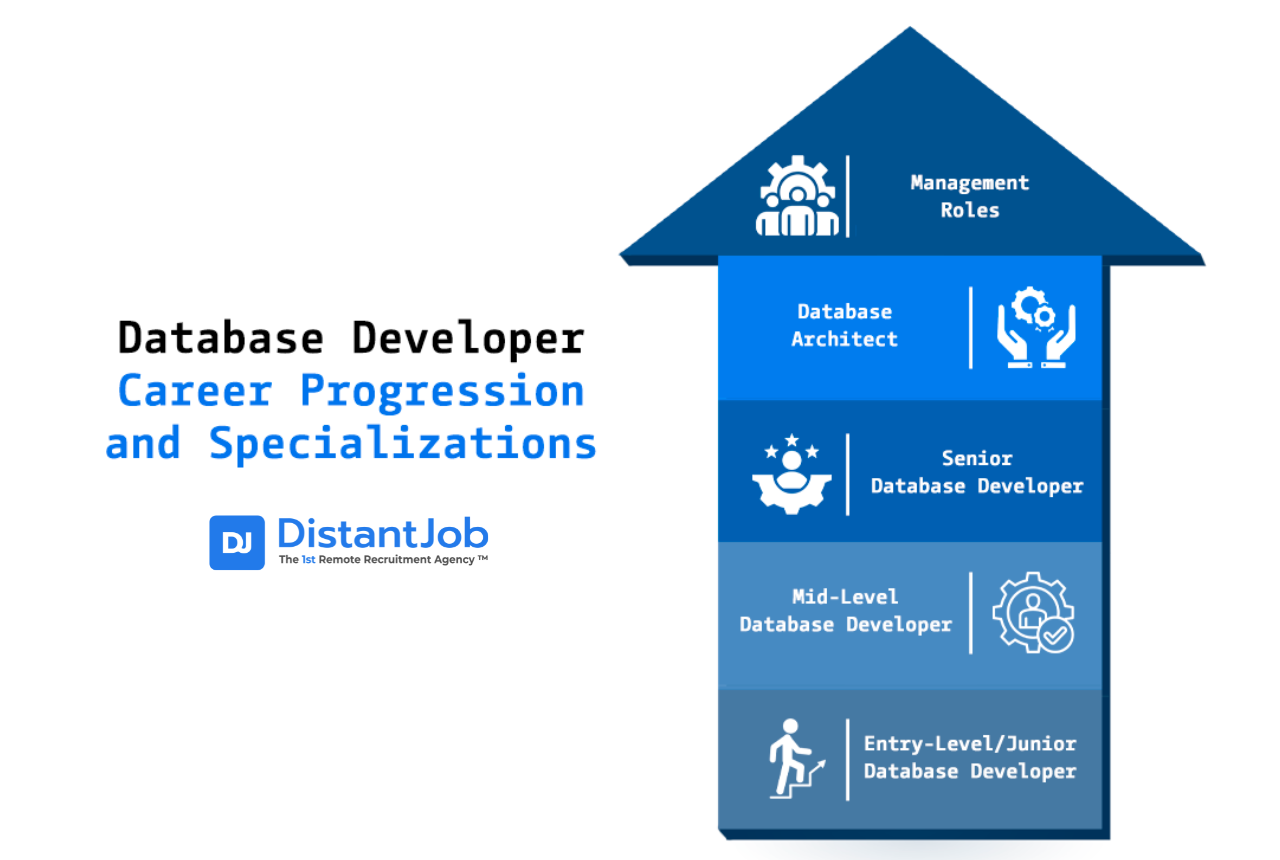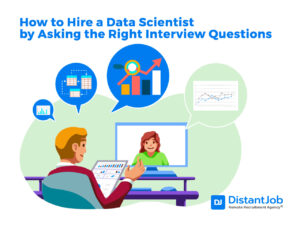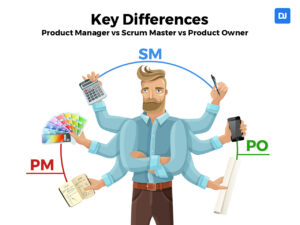The world runs on data—and database developers are the architects of this data-driven revolution. With Zippia predicting a 21% growth in database developer roles from 2018 to 2028, it’s clear their skills have never been more in demand.
As the backbone of effective data management, their work supports crucial business decisions and technological advancements.
This article explores the vital skills a great database developer needs, current salary expectations, and industry trends. Let’s start with the key technical skills a database developer should have.
1. Core Technical Skills

When looking for database development essentials, there are technical skills that are a must-have.
- SQL Proficiency – SQL programming skills are a priority to look for in database developers. For starters, developers use SQL (Structured Query Language) to interact with the database, including querying, updating, and managing data. Being proficient in SQL is what allows developers to retrieve and manipulate data stored in relational databases.
- NoSQL Technologies: Proficiency in NoSQL database technologies is crucial as these are optimized for storing unstructured data, which constitutes the majority of data today. Skills in NoSQL databases like MongoDB, Cassandra, or Redis allow developers to handle large volumes of unstructured data efficiently.
- Database Design – Database developers need to be skilled in conceptualizing and implementing the structure of a database. For this, they need a deep understanding of how to best organize data and define tables, columns, data types, and relationships between tables.
- Database Administration – As a database developer, you need to understand how to manage and maintain the health of the database. This means creating and setting up databases, monitoring and optimizing performance, ensuring data accuracy and integrity, implementing security measures, and managing user access.
- Data Modeling—Data modeling techniques involve creating a visualization of the data and its relationships within a database. They also involve defining how data is connected and how it will be stored and accessed.
- ETL (Extract, Transform, Load) – ETL processes are fundamental in data warehousing and business intelligence. They involve extracting data from different sources, transforming it into a suitable format, and loading it into a database or data warehouse. This skill is important for ensuring data consistency, accuracy, and readiness for analysis.
2. Programming Abilities
Python Programming
Database developers need to be proficient in various scripting languages, such as Python. Given its powerful libraries, like Pandas, for data manipulation, Python is essential for database developers. Proficiency in Python enables an easier transition from structured query languages and allows for complex data manipulation, enhancing the developer’s capability to process and analyze data effectively.
Big Data Technologies
Knowledge of Apache Spark and its component PySpark is valuable. Spark facilitates large-scale data processing and PySpark combines the power of Python with Spark, making it accessible for those familiar with Python. Understanding Spark SQL is also beneficial for seamless integration of SQL knowledge into big data processing frameworks.
Streaming Data and Real-time Processing
Skills in technologies like Apache Kafka and structured streaming are increasingly important, especially in environments dealing with IoT data or real-time data processing needs. These skills enable developers to build systems that can process and analyze data in real time, which is critical for applications such as live dashboards for monitoring manufacturing processes.
3. Data Security Knowledge
A critical component of a database developer’s role is ensuring the security of sensitive information. This involves implementing robust security measures such as encryption, data masking, and access control mechanisms.
Database developers must also be familiar with compliance standards relevant to data security, such as the General Data Protection Regulation (GDPR) and the Health Insurance Portability and Accountability Act (HIPAA).
They need to adopt secure coding practices, such as using parameterized queries to prevent SQL injection attacks. Database programmers must ensure that data integrity is maintained and that unauthorized changes or theft are prevented.
They should also be cautious about Table Permissions — who can read and write to what tables. Data developers need to also know who is authorized to perform the four basic operations of INSERT, UPDATE, DELETE and SELECT against which tables.
Programmers should embrace authentication best practices based on the set up of the infrastructure, nature of the application, user characteristics, and data sensitivity. Encrypt sessions with SSL Certificates to prevent packet sniffing if the database server is being assessed from an untrusted server.
In addition, they should secure all databases that trust all localhost connections, as anyone who accesses the localhost can access the database server.
4. Performance Optimization Techniques
The skill of capacity planning involves predicting future database requirements and scaling resources to accommodate growth. It’s about understanding the trajectory of data accumulation and preparing the infrastructure to handle this expansion without performance hitches.
Also, the ability to think in systems and understand the broader architecture, including data flow, source management, and end-use, is crucial. This involves designing and implementing data pipelines that support real-time data streaming and processing.
5. Handling Data Migration and ETL Processes
Another technical requirement to look for in database developers is their experience handling data migration and the extract, transform, load (ETL) processes. They will use ETL to review business goals, create and develop ETL solutions, tune existing packages/queries/tables to accelerate processing and prepare technical specifications.
Database programmers also build complete ETL packages to pull data from different sources, transform it according to business needs, and load it into the target database.
Finding a database programmer who possesses these technical skills is half the battle. You must also find someone with the social attributes to thrive in your organization.
Key Soft Skills to Look For in Database Programmers
Soft skills enable people to build and maintain relationships in the workplace. These relationships are crucial because individuals can collaborate to achieve common goals.
A database developer may need to work with a data analyst, data administrator, data architect, and other team members. The following are soft skills your hire should have:
1. Analyzing and Problem Solving
A database programmer’s job often involves handling large amounts of data, complex relationships, and intricate business roles. As a result, being able to break down complex problems into smaller, manageable parts and analyze them logically is an essential skill.
Data developers should be able to analyze data structures, relationships, and requirements to design efficient database schemas. They must understand how data will be used, queried, and manipulated to create appropriate models.
Developing database systems requires logical thinking to translate business requirements into database structures, queries, and procedures. Programmers must be able to think through the logical flow of data and the implications of different design decisions.
2. Communicating Effectively
Effective communication is an indispensable skill for a database developer. Being able to explain technical concepts to non-technical team members is essential for ensuring everyone is on the same page.
As the link between data and decision-makers, programmers who can communicate effectively will ensure that database solutions align with business objectives and user needs.
3. Focusing on Details
Having a keen eye for detail is an invaluable skill in data management, where even the slightest mistake can lead to significant consequences. For instance, an oversight during data entry could result in costly decisions.
An eye for detail means a programmer can meticulously observe, analyze, and address even the smallest nuances that could potentially impact the database design, implementation, and performance.
They can guarantee data integrity because they will ensure data is entered, updated, and maintained accurately. When designing Schema, detail-oriented programmers don’t overlook any aspects that could lead to data redundancies, anomalies, and performance issues.
These professionals employ the same approach for error handling, query writing, documentation, and every other task.
4. Collaborating with Teams
Modern database systems are often complex, so collaboration is essential. Database programmers will need to coordinate with other team members, such as data analysts, business analysts, and application developers, to ensure the database aligns with the project requirements.
This involves being able to articulate technical details and design decisions in an understandable way to less technical team members. Database programmers must be open to sharing their knowledge with stakeholders to contribute to the overall knowledge base.
In addition, they must be open to actively listening to different viewpoints and work towards mutually agreed-upon solutions.
5. Managing Time
Time management is another critical database programmer skill you must consider before hiring. Programmers must prioritize tasks based on their importance and dependencies. They should be able to multitask and context switch without causing downtime or delays.
Database developers must be able to predict the time required for tasks, set reasonable expectations, and deliver their work on time. Also, they must know how to balance reactive tasks, such as troubleshooting issues or urgent requests, with proactive work, like performance optimization or documentation.
Educational Pathways for Aspiring Database Developers
In most cases, to become a database developer, you need a Bachelor’s degree in computer science, software engineering, or a related field.
A Bachelor’s degree may be enough for a junior-level database role. But for higher-level roles, you can consider pursuing a Master’s degree or getting specialized database developer certifications in Computer Science, Data Science, or Database Management.
One minor note is that it’s not an obligation to have bachelor’s studies to become a database developer. There are many database developer training courses that have strong foundations and can help you land jobs. Let’s explore some of these:
- Certifications – Certifications are a great way to specialize in specific database technologies. Popular certifications include Azure Database Administrator Associate, Oracle Database Certification, IBM Certified Database Administrator, and Certified MongoDB Developer.
- Online Courses and Tutorials – Popular online platforms like Coursera, Udemy and edX offer courses on database development, SQL, NoSQL, database management systems and more.
- Bootcamps – Coding bootcamps provide a great opportunity to gain skills rapidly as they are focused on short-term intensive training. You can look for local university bootcamps tailored specifically for database development.
- Internships—If you have a basic understanding of databases, gaining work experience through internships or entry-level positions in IT can be invaluable. These opportunities provide hands-on experience and insights into the role of a database developer in a real-world setting.
Career Progression and Specializations
So, what does the database developer career path normally look like? Career progression within database development typically follows a path from junior to senior roles. You can expand your opportunities by seeking database developer training and courses and specializing in different areas, such as Warehousing, Big Data, and more.
The key here is to also keep up with the trends and data landscape that is always changing.
Generally, the database development career path looks like this:

- Mid-Level / Database Developer: With a few years of experience, database developers at this level handle more complex tasks such as advanced database design, performance tuning, and optimization.
- Entry-Level / Junior Database Developer: This role is the starting point for many in the field. Your responsibilities will include basic database design and maintenance, writing simple SQL queries, and assisting senior developers.
- Senior Database Developer: Senior developers have extensive experience and deep expertise in database technologies. They lead major projects, mentor junior staff, and make key decisions regarding database architecture and technologies.
- Database Architect: This is a more strategic role, focusing on designing database solutions for complex systems, often at an enterprise level.
- Management Roles: Experienced professionals may move into management roles, such as IT Manager or Database Manager, where they oversee teams and strategic planning for database systems.
Database Specializations
- Data Warehousing Specialization: Specializing in data warehousing involves designing and maintaining large repositories of historical data from multiple sources. Skills in ETL processes, data integration, and BI tools are crucial.
- Big Data and Database Development: Specialization in Big Data entails working with large, complex data sets. Skills in technologies like Hadoop, Spark, and NoSQL databases are essential.
- Database Security: Focusing on database security involves ensuring the integrity and security of data. This includes implementing security protocols, monitoring access, and compliance with data protection laws.
- Cloud Database Management: With the rise of cloud computing, specialization in cloud-based database solutions like AWS RDS, Azure SQL Database, and Google Cloud SQL is increasingly valuable.
- Database Optimization and Performance Tuning: This specialization focuses on maximizing the efficiency and performance of database systems. It requires deep knowledge of database internals and performance metrics.
- Specializations also involve the latest technologies and trends. Nowadays, popular options are machine learning and AI integrations, NoSQL and NewSQL databases and automation in database management.
Salary Expectations and Market Trends
The database developer job market continues to grow as data becomes the center of companies’ operations. However, salary expectations depend on several factors. Location, level of experience, and specialization can directly impact how much a database developer earns.
Let’s go over the different salary rates on a global scale:
Regional Salary Guide for Database Developers
If you live in the U.S., the average salary for a database developer is approximately $106,846 per year, and the average hourly wage is around $65.00.
On the other hand, developers from South America, given the cost of living, earn an average of between $40,000 and $65,000 per year (between $20 and $30 per hour).
Similar rates can be found in Eastern European countries, where the average salary of a database developer ranges from $57,000 to $80,000 per year (between $27 and $38 per hour).
Asian countries such as India and The Philippines tend to have lower rates ranging from $35,000 to $50,000 per year ($16 and $24 per hour).
Again, these are average rates. Regardless of the location, more specialized database positions will earn significantly more.
5 Key Factors That Influence Salaries
- Experience Level: Junior vs. Mid-level vs. Senior.
- Skills and Specialization: SQL, NoSQL, Oracle, cloud technologies.
- Industry: Finance, technology, and healthcare sectors might offer higher salaries.
- Company Size: Larger corporations vs. startups.
- Economic Conditions: Local cost of living, currency value, demand for tech talent.
What A Day in the Life of a Database Developer Looks Like
While the responsibilities and role overall of a database developer depend on the company and its projects, here’s a general overview of what you can expect regarding your daily tasks.
Core Responsibilities:
- Database design and development: A significant part of your date will be dedicated to designing and developing database systems. This involves writing and optimizing SQL queries, designing schema and implementing database features.
- Testing and debugging: You’ll test newly developed databases or modifications to ensure they function properly and debug any issues that may arise.
- Performance tuning: Part of your job involves frequently monitoring and tuning databases to optimize performance. This can involve adjusting queries, indexing or restructuring databases for efficiency.
- Data analysis and reporting: You’ll also spend time analyzing data to extract insights and turn them into reports for other departments or stakeholders.
- Project management activities: Part of your day may involve project management. This includes planning, setting timelines, and coordinating with team members on project tasks.
- Stand-up meetings: Many IT teams have daily or weekly stand-up meetings to discuss progress on projects and next steps.
Conclusion
A skilled database developer has it all—from SQL expertise to security know-how, data modeling to performance optimization.
However, finding the ideal candidate goes beyond evaluating their technical expertise. It’s also about ensuring they align with your business goals while solving problems efficiently and adapting seamlessly to your team.
So, how can you find the ideal candidate without breaking the bank? That’s where DistantJob steps in.
At DistantJob, we provide ongoing support throughout the hiring process, from headhunting to taking care of all the HR hassle. We focus on your company hiring the right people to build everlasting relationships.
Ready to find your ideal database developer?Let’s talk.





